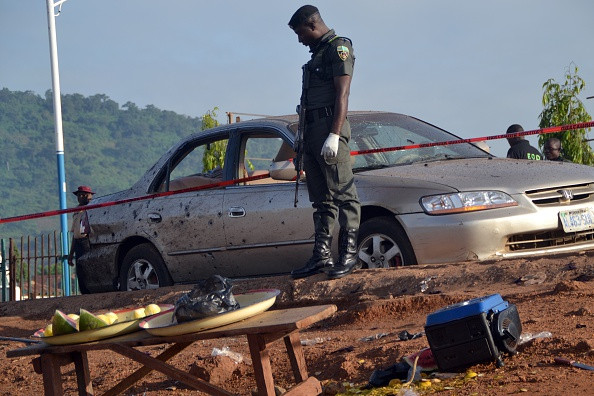Abuja suicide bombings: More attacks expected as Boko Haram 'relocating to the south'

A series of deadly terror attacks carried out by terror group Boko Haram in Nigeria's federal capital of Abuja might be a consequence of the military effort in the north-east, a UK-based intelligence has warned. David Otto, CEO of UK-based global security provider TGS Intelligence Consultants, told IBTimes UK that a Nigeria-led joint military operation comprising troops from five countries might push Boko Haram members into other areas in Nigeria.
He said: "Once an organisation is targeted in a particular area, the only way out is to spread to other areas and Boko Haram is an organisation that would take advantage of weaker areas." Shortly after taking office in May, President Muhammadu Buhari relocated the military headquarters to Maiduguri, capital of restive Borno state and Boko Haram's birthplace.
Nigeria also announced the creation of a new task force against Boko Haram – consisting of 8,700 troops from Nigeria, Niger, Chad, Cameroon and Benin – which is believed to have scored some successes, such as the recapture of a key town in Borno.
Who are Nigeria's Boko Haram terrorists?
Boko Haram (recently renamed Iswap) fights against Western influence in Nigeria and aims to impose its version of Sharia law in the country.
The group declared an Islamic caliphate in Gwoza, along the Cameroon border, in August 2014.
Boko Haram has raided several cities in the north of the country in a bid to take control of more territory.
Three states − Adamawa, Borno and Yobe − have been under a state of emergency since May 2013, due to Boko Haram's attacks.
"The military is doing a very good job in targeting most of the hideouts in the north, but because the military is concentrated in the north, Boko Haram sees an advantage in relocating to the south. They adapt according to the strategy that the government is using," Otto explained.
Boko Haram – which has killed more than 17,000 people since its insurgency became violent in 2009 – focuses its deadly activity in the country's north-east and northern Cameroon, with seldom attacks in central Nigeria and Niger. In 2014, the group detonated two bombs at a busy bus station in Abuja, killing 88 people. In 2011, the group claimed responsibility for a blast that killed 21 people and injured 60 at a UN building in the capital.
Referring to the latest blasts in Abuja in which 18 people were killed and 38 injured – according to estimates by the National Emergency Management Agency – Otto warned they might be followed by other attacks targeting civilians. He said: "The attack in Abuja means that Boko Haram is spreading to the south and is the signal that there will be more attacks, also because the latest bomb blasts targeted the civilian population.
"The attacks were expected," he continued. "The way forward is for the government not to concentrate in the north. More attacks are expected in areas such as Abuja and Lagos and Nigeria needs a comprehensive military strategy spread across the country to tackle this issue."
The Abuja attacks occurred weeks after Nigerian intelligence warned the military had uncovered a plot by Boko Haram to attack the capital. The news came days after the country's intelligence warned dozens of people linked to the Islamist outfit had been arrested in Lagos, Nigeria's commercial hub, suggesting the insurgence could spread beyond the country's north.
Buhari, who visited survivors of the Abuja attacks at the Trauma Centre of the National Hospital, condemned the attacks and said they were timed to disrupt celebrations of Nigeria's 55th anniversary of independence. Prior to the suicide bombings in Abuja, dozens of peope were killed in a series of blasts in Maiduguri.
The Nigerian government alleged that the Boko Haram is surrendering, while the group said in an audio message that claims made by government and army are false. The person heard speaking in the audio is believed to be the group's leader, Abubakar Shekau, who is rumoured to have been replaced due to his repeated absence from the group's videos.
In August, Chad's President Idriss Deby alleged Mahamat Daoud had replaced Shekau as the leader of Boko Haram. Shortly after, Shekau released an audio message denying the claim. Some analysts have also alleged that since the group pledged alliance to the Islamic State (Isis) terror group earlier this year, Shekau has stepped aside as Boko Haram now takes orders from IS leaders.
© Copyright IBTimes 2025. All rights reserved.






















